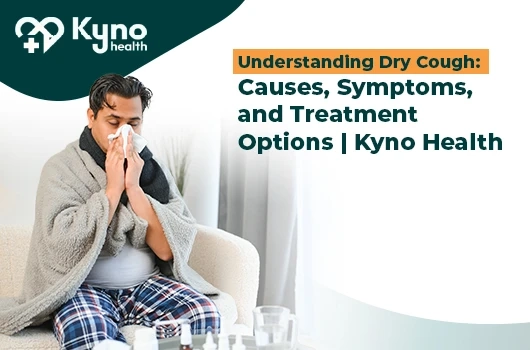Introduction:
A persistent dry cough can be more than just an annoyance; it can signify underlying health issues that need attention. At Kyno Health, we understand the impact that such symptoms can have on your daily life. In this detailed guide, we'll explore the various causes, symptoms, and dry cough treatment options to help you find relief and improve your health.
1. What is a Dry Cough?
A dry cough, also known as a non-productive cough, does not produce phlegm or mucus. It can be irritating and often becomes more pronounced during the night, affecting sleep quality and daily functioning. Understanding the causes and symptoms is essential for effective dry cough treatment.
2. Common Causes of Dry Cough:
Several factors can contribute to a dry cough. These include:
Environmental irritants: Smoke, pollution, and dust can trigger this type of cough.Allergies: Pollen, pet dander, and other allergens are common culprits.Infections: Viral illnesses, even after other symptoms have resolved, can leave you with a lingering cough.Chronic conditions: Asthma, GERD, and postnasal drip are often associated with a chronic dry cough.3. Symptoms Accompanying a Dry Cough:
Identifying accompanying symptoms can help pinpoint the underlying cause, which is crucial for an effective dry cough treatment plan. Symptoms to watch for include:
Throat irritation and sorenessHoarsenessBreathlessnessSleep disruption4. Dry Cough Treatment Options:
Effective treatment for a dry cough will depend on its cause. Kyno Health provides personalized treatment plans based on thorough diagnostics and assessment.
Medications: Antitussives (cough suppressants) and inhaled bronchodilators can be used to treat a dry cough, depending on its etiology.Home Remedies: Honey, warm liquids, and humidifiers can provide symptomatic relief.Lifestyle Changes: Avoiding allergens and quitting smoking are essential steps in managing a dry cough.5. When to Seek Professional Dry Cough Treatment: It's important to consult with a healthcare provider if your dry cough persists for more than a few weeks, is severe, or is accompanied by other worrying symptoms such as fever, weight loss, or night sweats. Kyno Health offers comprehensive in-home consultations to diagnose and treat the cause of your dry cough effectively.
6. The Role of Kyno Health in Managing Dry Cough: At Kyno Health, we bring healthcare to your doorstep. Our team of experienced healthcare professionals is equipped to manage various conditions, including persistent dry coughs, with the latest in medical protocols and personalized care plans.
Conclusion:
A dry cough may be more than a minor nuisance; it could be a sign of a more serious condition. Recognizing the symptoms and understanding the causes are the first steps toward effective treatment. With Kyno Health’s personalized dry cough treatment plans, you can achieve relief and return to your normal activities with greater ease and comfort.
For more detailed information or to schedule an appointment, visit Kyno Health website or contact us directly. Let us help you breathe easier with expert healthcare solutions tailored to your needs.


